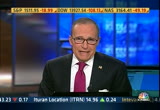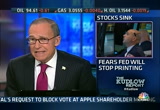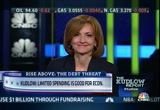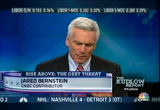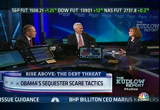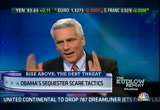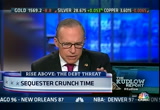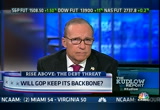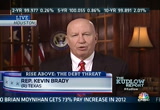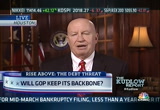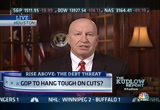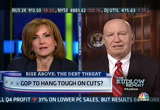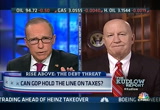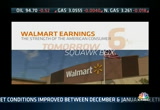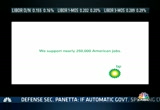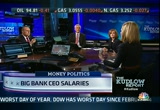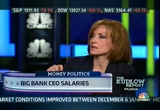tv The Kudlow Report CNBC February 20, 2013 7:00pm-8:00pm EST
7:00 pm
plus at office supply stores. rewards we put right back into our business. this is the only thing we've ever wanted to do and ink helps us do it. make your mark with ink from chase. but at xerox we've embraced a new role. working behind the scenes to provide companies with services... like helping hr departments manage benefits and pensions for over 11 million employees. reducing document costs by up to 30%... and processing $421 billion dollars in accounts payables each year. helping thousands of companies simplify how work gets done. how's that for an encore? with xerox, you're ready for real business. all stations come over to mithis is for real this time. step seven point two one two. verify and lock. command is locked. five seconds. three, two, one.
7:01 pm
standing by for capture. the most innovative software on the planet... dragon is captured. is connecting today's leading companies to places beyond it. siemens. answers. okay. we're back in that vortex where we're going to hear a lot of negative stories coming out of washington about job losses, about things go wrong. and it is going to frighten people, and they are going to do some selling. beware that plus the federal reserve notes caused a lot of the weakness today, but i'm telling you to stay the course. i like to say there's always a bull market somewhere, i promise to try to find it for you here on "mad money." i'm jim cramer and i will see you tomorrow. good evening, everyone, i'm larry kudlow, this is the "kudlow report." okay. repeat after me, america. spending cuts and limited government are good for economic growth. it's called free market capitalism and, get this,
7:02 pm
despite the armageddon scare tactics coming out of team obama, we took a closer look at the cbo numbers and this big bad budget cut is not -- is just $44 billion. it is not the $85 billion that has been advertised. and you know what, $44 billion compared to our overall budget spending and our gdp is nothing. but many of the mainstream news media are echoing white house scare tactics and one question is whether the gop can take the pressure. there's eight days before the sequester kicks in. can republicans take the pressure? and finally, let's not forget the other big money stories right now, stocks suffer their first day of the year on fears maybe the fed may stop all that money printing. but i think that too is much ado about nothing. help is on the way, the "kudlow report" begins right now.
7:03 pm
first up this evening, president obama continuing to resort to sequester scare tactics, lobbying against those automatic spending cuts that were really his own brain child. take a listen to what he said about the cuts on the day he signed the budget control act back in august 2011. >> this compromise guarantees more than $2 trillion in deficit reduction. it's an important first step to ensuring that as a nation we live within our means. >> all right. well, i agree with the president. so if it was true then, shouldn't it be true now? limited government spending, live within our means, it's good for economic growth. joining us now for the full hour, cnbc contributor jared bernstein, former chief economist to vice president biden and we welcome back new york republican congresswoman nan hayworth. in my world of free market economics as you know, spending cuts, limited government,
7:04 pm
stronger private sector, great for economic growth, happened during the clinton years, happened during the reagan years, happened after world war ii, it happened during the calvin coolidge '20s. >> uncle, uncle. >> the calvin coolidge '20s. >> i think your $44 billion is a legitimate number because that's t o the outlays versus the cuts which takes place over more than one year. it comes out of the economy, just not in one year. if you look at the nonpartisan shops who have looked at the impact on the economy, they all coalesce around one number. they say this sequestration if it takes effect and holds will take about .5% of gdp growth out of the 2013 economy. now, that doesn't sound very good to me. we were just talking about how the economy's already growing too slow as far as we're concerned. i don't believe the fourth quarter recessionary number. i think that's going to be revised up. but if you think this is an economy that can take a 50-basis point whack to gdp growth, perhaps we're in a different
7:05 pm
world. >> here's the thing, let's go through this. 44 billion is the real number and it's funny, i found this today courtesy of my friend. what is that? $44 billion of spending cuts is 2 1/4 of 1% of gdp. so these are such tiny -- but the benefits, the benefits of confidence and certainty and free markets, i think vastly overwhelm these keynesian multipliers. >> and there's really no such thing as a keynesian multiplier. i mean -- well, really. >> do we need a stretcher? >> do we need a band-aid? >> my ears are bleeding. >> but, you know, certainly i've heard cogent arguments that even he would disapprove of what's been happening over the last several years.
7:06 pm
keynesian was meant to be short-term sort of loosening of the money supplies. it was psychological, well, technology's changed, life has changed the pace of the economy has changed. we have had dismal growth. as you mentioned, jared, we haven't hit the speed we need to really accelerate, you know. we -- because we've had an economy that has been held back by massive new regulation. the affordable care act, obama care, dodd/frank, alone. if we could eliminate those burdens, we'd be far better off. >> so, look -- >> you hate that. go ahead. take a whack at it. >> that's the republican party line. if you look at janet yellin gave a speech the other day, and i don't think she's a democrat or republican -- >> she's a democrat. >> okay. she's -- she's a technical analyst. >> she's a liberal democrat. >> she's a technologyist when it comes to the economy, and you said you respect her, so that goes a long way with me.
7:07 pm
and she had a graph that showed in every other recovery that we've had, fiscal policy was not a drag, it was a boost. in this recovery, fiscal policy has been a big drag. now, you talk about spending, in fact, we've been cutting spending. our deficit is getting small smaller -- >> by the way, i will say this, i will say this. that's an interesting point. i don't agree with the other stuff because you had a big tax hike, that was your own -- >> exactly. >> but i will say this, republicans have done better than you all probably think you have. now, it's true what jared said. spending as a share of gdp which is the ultimate measure, spending, federal spending as a share of gdp peaked at -- >> 25%. >> 25.2% in 2009. that was the height of the recession. >> yeah. >> and then it's gone to 24% in 2011 and it's 22.8% last year in 2012. >> as you know -- >> some of that is because the recession is over. >> we had a house majority.
7:08 pm
>> absolutely. the house majority has led the way insisting on spending cuts. and one of the -- the reason we have the sequester, really the president is the father of this sequester as we all know because he insisted at the tail end of negotiations in the summer of 2011 that $400 billion worth of new revenue burdens be place edn the american economy. and republicans, you know, led by the speaker refused that. >> let's not -- you're right. there's a lot of history here. i've got to get somebody else in. you're going to be with us the whole hour. so when the sequester happens and when republicans feel the heat from the white house and the mainstream media, will the gop keep its backbone? okay. this is going to be so difficult. i don't think anybody's convinced yet. what did speaker boehner mean when he wrote in the "wall street journal" op-ed today. and he said, quote, a week from now, a dramatic new federal policy is set to go into effect
7:09 pm
that threatens u.s. national security, thousands of jobs and more. whoa. that sounds like president obama's argument. that's why i didn't get it as much as i admire boehner. i've got to talk about this. in fact, i've got to talk about it with one of the best economists in the house. vice chair of the joint economic committee. actually, kevin, aren't you the chairman of the joint economic committee now? >> i am incoming chairman, yes. >> well, that's good to hear. but i didn't understand. what's mr. boehner saying? threatens national security? thousands of jobs and more. that's what president obama's saying. what message is boehner sending? you explain this to me. >> look, i think part of the challenge is that these cuts aren't designed the way we would want them. we are worried, of course, about the cuts to national defense. but overall, for us, this issue is about growth. put this in perspective, if the economy were a football field, these spending cuts are one
7:10 pm
step. one step on that field. we've tried. i think the crowd that said let's spend it, let's stimulate, borrow the money for the economy had their chance, they failed, unemployment's higher today than it was when the president took office. 3 million jobs still short. >> all right. i agree with you. >> i think these cuts need to occur. >> the whole point of the exercise of limited government is pro-growth. limited government -- why didn't the speaker say that. this is so dark and dreary, people are asking today, kevin brady, because of what mr. boehner said in this odd message, are asking if the republicans are going to stay with the sequester. you only got a week to go or so. >> the republicans are going to stay with the sequester. it's a small step toward getting our budget balanced again. it will tell the business community that has trillions of dollars sitting on the sidelines that it is a bit safer now to invest than it was before.
7:11 pm
and i think the speaker was basically saying after these cuts occur, there's an opportunity to make some redesigns to provide some flexibility. but we're going forward with this. this is a small, but important step. >> so representative, brady, this is jared bernstein, do you disagree on the points he made that larry quoted a minute ago? the idea these cuts compromise national security? cost lots of jobs, furlough lots of military folks? do you fundamentally disagree with that? and if you do, please explain why, and if you don't, how come that's okay with you? >> i think the speaker was quoting directly from president obama and secretary of defense who warned him about what the impacts the way this was designed. i don't know what the president responded to him since it was the president's ideas to make these cuts. >> -- i think you're saying. >> at this point, i actually believe the strongest signal we can send for the economy is to go forward with the spending
7:12 pm
cuts. we can argue later about the flexibility within the agencies, but i think this is critical. and i think, too, the business community's wondering is congress -- this white house ever serious about getting our financial house in order. this is the first step toward it. >> congressman, i've got an old friend of yours, nan hayworth right here. tough questioner. >> take it easy on me, nan. >> well, thank you for everything you're doing for every single american. but my question for you is as you know, the pressure on the house republicans, especially is going to be to compromise. and what i'd like to -- in order to work with the president if he should become adamant about revenue increases instead of the sequester, how are you going to address that question of the gop? >> you know, tax revenues are off the table. the truth of the matter is, the president had his chance during the fiscal cliff, they had the bases loaded, all nine innings,
7:13 pm
they scored one run, and now they want some extra at bats, extra innings for higher taxes, it's not going to happen. the truth of the matter is, that republicans in the house are determined to close tax loopholes, but we're not going to do it to fuel more of the president's spending, we're going to do it to lower rates for families and businesses. >> i would just say, kevin, just as a parting thought, i think the messaging here should be pro growth, and i think you have every right to say, jared won't agree with me, i get that and a lot of democrats won't agree. you have every right to say that limited government is pro-growth and that, in fact, we saw that spending to gdp come down to the clinton years with good growth, during the reagan years with good growth, all the way back to post world war ii with good growth. and i think you all need a growth message. i think it's too austere. i really do. >> i agree. and i'll tell you, that's what main street is saying, as well.
7:14 pm
and they're not going to stop hiring until we remove some of the road blocks. >> thank you ever so much, sir. we appreciate your time. >> thank you. gas prices, still on a streak. they're higher for 34 straight days in a row. we're trying to find out next. later on in the show, wait until you hear what one american ceo told a top french politician about the quality of french workers. here's a hint, it was not magnificent. lower spending, limited government, a little tax reform, and you speak french. >> oh -- >> we've done this. i'm kudlow, we are coming right back. [ engine revving ] ♪
7:15 pm
[ male announcer ] every car we build must make adrenaline pump and pulses quicken. ♪ to help you not just to stay alive... but feel alive. the new c-class is no exception. it's a mercedes-benz through and through. see your authorized mercedes-benz dealer for exceptional offers through mercedes-benz financial services. through mercedes-benz the people of bp made a commitment to the gulf., and every day since, we've worked hard to keep it. today, the beaches and gulf are open for everyone to enjoy. we've shared what we've learned, so we can all produce energy more safely. bp's also committed to america. we support nearly two-hundred-fifty thousand jobs and invest more here than anywhere else. we're working to fuel america for generations to come. our commitment has never been stronger.
7:17 pm
so, crude oil had the worst day in three months today, closing down 2% while gold was also down almost 2% on the day. and as gas prices rise for the 34th day in a row, is $4 gasoline coming nationwide? here now is cnbc contributor, founding partner. what's going on here? crude oil fell today and i know crude oil's gone up, but i don't see why the gasoline price have
7:18 pm
gone up as much. tell me why. >> well, larry, it's a unique market. and we really have spiked since the news, the latest news of t st refinery being shut down along the east coast. hess announced closing the port redding refinery, a little gasoline maker down in new jersey. that tipped the balance. >> why? why are they closing? >> they say the economics aren't there for them to operate the unit profitably. this now adds up to over 1 million barrels of refined capacity. >> did hurricane sandy have anything to do with that? >> no. >> i know he runs a good shop. >> they've stated in their quarterly puts, been losing money quarter after quarter. >> not coming back up? >> no, this isn't for maintenance or tooling around, this is gone, good-bye, and we have over 1 million barrels worth of this happened over the past year, larry. unfortunately, here's the nightmare scenario for me. all this great talk about us becoming energy independent, drilling more oil, getting more oil out of the ground, we're not going to have the refineries to make it to gasoline. now we're going to be addicted
7:19 pm
to foreign gasoline instead of foreign oil and we'll be in the same soup as we're seeing right now. >> nan, have we overregulated the refinery building process? this is a big issue. i want the keystone pipeline to get the oil down into the gulf coast refineries. but we need more refineries according to john who knows a lot about this. >> well, to my knowledge, john, i think it's been 30 years, has it not since we built a new refinery in the united states? >> they've just been shutting them. forget about building a new one. >> part of the problem is there has been a massive misallocation of capital vis a vis the market. going into developing safer, better more environmentally sound forms of carbon energy have gone into less useful technologies. >> is there too many boutique fuels that have to be refined now? >> yeah. >> is that part of the problem? >> no, that's totally part of
7:20 pm
the problem. these epa attainment rules, if you were to look at them on the map that the epa puts out across the country, it can vary from city to city, county to county. if we could have a national blend or two, that would, you know, bring a lot of this -- >> call the dogs off -- call these dogs off. these regulatory dogs. >> well, before we get too excited, it seems to me that -- whether or not there's too many regulations, i don't think there's been a change in the regulatory environment that these refineries have been operating under. that is, you'd have to show me there's been a lot more. have there been a lot more regulations leading to refineries? >> the biggest changes go back to the clinton administration, the new source rules. if you did anything substantial in a refinery, it would have to comply with the new standards. >> since then, the prices have come way down and -- >> absolutely. and some of the big refineries that supply the oeast coast, larry, have been in the caribbean, not here. >> i always used the rule of thumb that eventually gasoline
7:21 pm
prices will follow crude oil prices. i still think that rule of thumb is applicable. what is going to happen here? >> well, at some point, they are making -- the ones still in business refining crude oil and gasoline are making an absolute fortune. these are numbers i can't get my head around. when i grew up doing this, $8 a barrel was your profit margin on gasoline, now making over $40 a barrel from crude oil -- >> why is that -- that's not good. >> the market should be saying -- >> i'm not saying. >> that's not good. >> that's why delta airlines bought their own refinery. >> looking into buying a refinery. >> doesn't sound like a free market. that's the trouble. >> sounds like a market failure. >> is it a free market? >> there's an overconcentration. it's broken right now, larry. certainly when you have a low-cost feed stock like you do right now with crude oil and these are astronomical gasoline prices, i'm afraid they're not going to go down this time. because of the arab spring, maintenance for the refineries,
7:22 pm
different issues, which is part of this issue right now. that can go away too. it might not go away this time because this refinery. >> i've got to get out. where is the price of gasoline going nationwide? >> headed for $4 a gallon. yeah, there's a squeeze going on right now in the market, going to rip through the country. >> what if the saudis come back up. >> not enough to overcome. >> we've got to print more oil but refine it too. thank you, ever, ever so much. now the city of detroit hitting the skids again. jesse jackson jr. going to jail. one american ceo is really slamming the french. we have all those big stories coming up next. stay with us. scalpel.
7:23 pm
7:25 pm
the city of detroit in a financial emergency, it is a complete mess. now the question is, what are the next steps going to be to save this thing? kayla tausche has that story and more. good evening, kayla. >> good evening to you, larry. first up, rick snyder may soon turn the city over to an emergency manager. that manager could run the finances and try to find ways to save money, also the one to decide whether to take detroit into municipal bankruptcy. and jesse jackson jr. is likely headed to prison. he pleaded guilty to misusing $750,000 of campaign funds. he bought himself a $43,000 rollex, as well as bruce lee and michael jackson memorabilia. he'll be sentenced in a few weeks and could face five years in prison. listen to this, from the ceo
7:26 pm
of titan, a french official sent a letter to maurice taylor to see if he'd be interested in taking over the french tire factory. gets paid high wages but works only three hours, one hour for breaks and lunch, talk for three, and work for three. taylor says titan will buy a factory in india and china and pay the workers a lot less. nice work if you can get it. >> nice work if you can get it. have you ever heard of anything as ridiculous as what kayla just not made up, reported factually about french non-work habits. >> we've heard for years about the ever shrinking french workweek. this is a country that elected a president thought there was nothing wrong with having the top tax rate be 72% clearly punishing work and productivity. so sadly it's not surprising and it's much to be -- >> if you pay them not to work,
7:27 pm
jared, this is my worry about your administration. if you pay them not to work, they won't work. >> i'm sorry to bring some numbers and facts to the discussion as opposed to these anecdotes, but french productivity levels, not the growth rates, the levels are the same as ours. french -- the french workforce is as productive as our workforce. now, they don't take their productivity in consumption, they take it in vacations. they are equally as productive -- that's what the numbers show. >> the reason why those productivity numbers look so good, there's no hours worked. they don't work. you can't have -- i understand the measurement -- >> the output per hour is about the same -- >> there's no hours work. you think -- >> i will say i worked in brussels, i worked in london, i had 60 days vacation, a one-hour lunch break every day, life was good, you know -- >> and you can fall back on the state. >> this is -- >> i went to the hospital for free as an american citizen. >> thank you, kayla.
7:28 pm
this is a caricature. >> i've got to get out -- many thanks to kayla tausche. i've got to get going. >> you make a lot of sense. first off, don't you just know that almost all of the news media's going to slam republicans when the spending sequester kicks in. it's already happening now even though it was the president's own idea. next up, we're going to talk to top media critic brent bozell about all the scare talk and whether the gop can actually survive this whole onslaught as a viable political party. once again, i'm telling you. america don't fear the sequester, help is on the way. got to be tough. ♪
7:29 pm
[ male announcer ] to hold a patent that has changed the modern world... would define you as an innovator. to hold more than one patent of this caliber... would define you as a true leader. ♪ to hold over 80,000... well that would make you... the creators of the 2013 mercedes-benz e-class... quite possibly the most advanced luxury sedan ever. see your authorized mercedes-benz dealer for exceptional offers through mercedes-benz financial services. transit fares! as in the 37 billion transit fares we help collect each year. no? oh, right. you're thinking of the 1.6 million
7:30 pm
daily customer care interactions xerox handles. or the 900 million health insurance claims we process. so, it's no surprise to you that companies depend on today's xerox for services that simplify how work gets done. which is...pretty much what we've always stood for. with xerox, you're ready feal business.
7:31 pm
welcome back to the "kudlow report." i'm larry kudlow. in this half hour, the markets had a healthy correction today, healthy. stocks fell across the board. gold and oil got slammed too, but don't fret because there was always some very good news from single family housing starts and a surge of bank loans to businesses. both could be key factors for this economy.
7:32 pm
but first up with the sequester cuts over a week away, the washington blame game has already begun. my next guest says expect president obama to try and blame republicans for the sequester, of course, and the media will play along. but i think the gop's got a message problem. i think they're playing too much obama austerity and not enough economic growth for the private sector. but let's talk. here now is brent bozell founder and president of the media research center and welcome back our panelist jared bernstein and nan hayworth. i'm going to read some of the adjectives. they're basically doing, this is the foot stool lap dog thing. jobs and the economy going down, public safety going down, and so forth and so on. we know that, but brent, i want to ask you. this is a tough one. is the gop going to survive this
7:33 pm
obama onslaught? >> boy, good question. three things are going on here. first, it is the obama administration serial dishonesty. i can't believe how dishonest these people are where they are blaming the republicans for their own idea. this sequester was their idea. they sold pelosi and reid on it. this is their idea, republicans signed off on it, but this was their idea. the serial dishonesty of so many in the media who call themselves reporters when all they are are press agents for the obama administration. the third problem to get to your question is the serial incoherence of the republicans. >> right. >> i don't know what their response is. are they going to give in? well, they better come up with an answer because they're stuck between a rock and a hard place. on the one hand, if they give in to obama, if they don't give in to obama, there will be the
7:34 pm
political costs, it'll be blamed on them. but if they do give into obama, crumble one more time, i suspect they'll lose their majority in the house. never regain it in the senate. >> the party really splits and may never get it back. do you want to talk to brent bozell? >> to what extent -- and having served in the last republican conference, there certainly was a contrast between those who felt we were betraying our principles if we worked too closely with the obama administration and those who felt that it was better to get a first down than lose yardage entirely. how do you think the republicans should approach that job and that message so they do look coherent and they do move forward? >> well, first they have to have a message. you know, the republican party of being the party of growth and opportunity and limited government and limited taxes, look that's gone. that was something of a quarter
7:35 pm
century ago. that is not applicable today. if they want to regain it, they've got to sell it. >> right. why can't they get it back, brent? why can't they get it back? >> pardon me? >> why can't they -- i'm a reagan guy, i learned it from reagan. okay, i think you did too to some extent. growth and opportunity and prosperity. it's the private sector, not the government that's going to create that prosperity and that's an optimistic message. but they don't have it. >> can i -- >> boehner who i respect, writes a piece in the "wall street journal" and says this whole sequester thing is going to ruin national security and jobs in the economy. sounds like obama. >> let me just say -- i happen to think there's a lot of wisdom in what you just said. but when brent and frankly other folks sitting here with me today engage in exactly the blame game that you say you don't like, it's very counterproductive. we're not talking about the economy -- we're saying he did it, he did, she did it. that's way too nuanced.
7:36 pm
the fact is that austerity measures are what's hurting growth right now. so i don't think more austerity will help, but i totally agree with you that we ought to be talking about the economy not playing this silly blame game. >> but see, brent, here's the thing. let's go back to the media for one second. media is echoing the obama assault essentially. as i said, butcher's knife, meat cleavers, this is all going to be ruined. and by the way, it's a $44 billion budget cut. that's all it is. hardly a fraction of gdp and overall spending and making it out to be armageddon. why doesn't the media do homework and say, wait a minute, this is probably a small spending cut, probably what we need. >> no, but larry, it's not why don't the media do their homework. they're beyond redemption as far as i'm concerned. the question is, why don't republicans do their homework? your numbers $44 billion, i thought it was $85 billion.
7:37 pm
>> no -- we did -- it's a congressional budget office. but listen to me, budget authority, yes, $85 billion, cash spending only $44 billion. >> but let finish my thought here. let's go with my bloated out of control number of $85 billion. >> okay. >> that's 2% of the budget. what the republican party should be saying to mr. and mrs. america, this is an out of control government and they can't even cut 2% without claiming that the world's going to come to an end. that should be the republican party message. this should be a no-brainer. >> how about this. let me ask you this, we're talking about the republicans, maybe too much, maybe the democrats will get blamed for this, maybe the democrats will be blamed because people in this country are fed up with overspending and debt and deficits and the lousy recovery, right? still hasn't blossomed. even jared said it hasn't blossomed yet. there's risk here for the democrats that they want to stop spending restraint that the rest of america wants. >> well, that's it and goes back
7:38 pm
to what you were saying, larry, our message should be that we are doing these things to grow the economy. we're not taking money out of the economy. 're letting it stay in the pockets of hard-working americans. we are -- we are giving them the opportunity to save billions of dollars that they can put to work in their home -- >> i think problem republicans have -- i think the problem they have right now and the polls are supportive of this, they see the president coming forward with a compromise. he's saying i want tax increases too where the other side is saying, no, just spending cuts and at least the way that's playing with the public is one guy, the president's willing to compromise, the other folks are stone walling. and that's why i think the risk lays probably more with republicans for the blame. >> let me ask you one more here. do you think the media, first of all, understands it was obama's idea in the first place? will they ever acknowledge that?
7:39 pm
>> one, i don't think they care. they really don't care about looking at those things. look, and to get what your guest just said a minute ago. that's true if republicans allow it to be true. what republicans should be saying with one voice is we bit our bottom lip until blood came out with the last tax increase. within three minutes they wanted another one. we're saying no more to tax increases. >> i think they are saying that. >> guess what, they won't. >> i don't think, by the way -- >> what's that? >> i don't think people are really going to buy into this armageddon scenario. for a lousy $44 billion or lousy $85 billion. seriously, i think risk for obama is he's overplaying his hand on national security, hundreds of thousands of people -- this is a small amount of money in a gigantic budget and budget deficit. >> and, jared -- >> the earthquake -- >> go ahead. >> right now, if republicans stand their ground, that will be
7:40 pm
the earthquake. >> what do you think? let me ask you, former house member, republican side, will republicans stand their ground? th a matter of principle. limited government and spending restraint. >> they're going to stand tall for the american people. it should be a positive message. but sadly, shame on the president for constantly returning to a message that tells us that something dire is going to happen that i'm going to, you know, this dog is, you know, i'm going to shoot this dog if we can't get this resolved. >> he wouldn't admit it was his sequester. and by the way, the washington post, the fact checker gave obama four pinnoccios. we appreciate you coming on the show. >> thank you. just how many big names on wall street making these days? kayla tausche will join us with numbers and the latest on the
7:41 pm
growing calls to strip jpmorgan chief jamie dimon of some of his power. all stations come over to mission a for a final go. this is for real this time. step seven point two one two. verify and lock. command is locked. five seconds. three, two, one. standing by for capture. the most innovative software on the planet... dragon is captured. is connecting today's leading companies to places beyond it. siemens. answers.
7:42 pm
how do you keep an older car running like new? you ask a ford customer. when they tell you that you need your oil changed you got to bring it in. if your tires need to be rotated, you have to get that done as well. jackie, tell me why somebody should bring they're car here to the ford dealership for service instead of any one of those other places out there. they are going to take care of my car because this is where it came from. price is right no problem, they make you feel like you're a family. get a synthetic blend oil change, tire rotation and much more, $29.95 after $10.00 rebate. if you take care of your car your car will take care of you. you know it can be hard to lbreathe, and how that feels.e, copd includes chronic bronchitis and emphysema. spiriva helps control my copd symptoms by keeping my airways open for 24 hours. plus, it reduces copd flare-ups. spiriva is the only once-daily inhaled copd maintenance treatment that does both. spiriva handihaler tiotropium bromide inhalation powder
7:43 pm
does not replace fast-acting inhalers for sudden symptoms. tell your doctor if you have kidney problems, glaucoma, trouble urinating, or an enlarged prostate. these may worsen with spiriva. discuss all medicines you take, even eye drops. stop taking spiriva and seek immediate medical help if your breathing suddenly worsens, your throat or tongue swells, you get hives, vision changes or eye pain, or problems passing urine. other side effects include dry mouth and constipation. nothing can reverse copd. spiriva helps me breathe better. (blowing sound) ask your doctor about spiriva. i've always kept my eye on her... but with so much health care noise, i didn't always watch out for myself. with unitedhealthcare, i get personalized information and rewards for addressing my health risks. but she's still going to give me a heart attack. that's health in numbers. unitedhealthcare. who makes what? it's always a question people
7:44 pm
want to know, especially about those big bank executives. kayla tausche joins us again with some numbers. >> it's been nearly five years since the financial crisis and executive pay at banks, no surprise creeping back up. we decided to check out the report cards, what the top dogs are taking home versus what the shareholders are getting. just this week, just yesterday, actually, bank of america ceo got a big raise, $12.1 million in pay for 2012, that's a 73% jump from the prior year for brian moynihan, but in a year where net income and the stock jumped 103%. thee salary was frozen. the board bumped up to $1.5 million there, as well, that's nearly double the $800,000 he had been making. his total take home for last year $9.75 million, that's a drop, but the company stock rose the least of the peers and full-year earnings swung to a loss. goldman sachs putting up impressive numbers for the year,
7:45 pm
net earnings up 68% and the stock up 33% in the same period. the board awarded lloyd blankfein a reported $21 million, up 75% from last year. he also got to cash in some stock options on december 31st, just before taxes got hiked. and while blankfein took home nearly double, jamie dimon too many home half of what he took home last year, as a result of a botched credits dierivative. a record year for the bank up 16%, the stock up nearly 30% there, but that still hasn't shopped shareholders from raising fists about the chairman role getting split for dimon. just today a bunch of pensions coming out and saying they'd like to see that role split, that's going to go in the company's proxy. >> you used the word penance, i think that's a important word here. this business about splitting up the chairman and ceo and knocking his total compensation down because of the incident in
7:46 pm
london, how much penance -- how much are they going to stay after him? how much trouble is he in at jpmorgan? >> i don't think much, larry. as long as the bank continues to post record profits, which it has. in the second quarter when that trade first started losing money in the third quarter, each one a record of the last one. the board cut the pay as a symbol to the market that was what they were symbolically going to do. you can't penalize an executive that much when of your peers you're trading the best, you have the best return on equity and profits are record. >> if $11.5 million a year is a penance, could somebody please punish me? because the median salary is like $40,000. >> you think they make too much? honestly in your heart and mind you think they make too much? >> yeah, i do think they make too much. but kayla's numbers show when they have a bad year, they do worse -- >> but it's interesting when their earnings are down 70%,
7:47 pm
their pay doesn't fall 70%, falls maybe 20%, it's not apples to apples there. there's a little bit more art than science here. >> what was going on in my head listening to those numbers was, gee, kind of want to raise the minimum wage to $9 an hour. i know i'm at the other end of the spectrum there, but it seems like a reasonable place -- >> let me ask you this -- why do we pay so much in the financial services industry? in other words, i'm a free market guy -- >> right. >> i say you earn it, you get it, god bless. >> you think they earn too much too. >> why don't we get these young kids to get paid a lot in manufacturing or in energy which is a fabulous coming business that the country needs. or, i don't know -- >> great question. >> some technology. why is it all financial services? >> well, i think it's a combination of markets and what the law and tax policy and various forms of structural
7:48 pm
factors -- >> money. >> well, it is -- >> manufacturers don't pay that kind of money. >> well -- >> they should, by the way. >> you're right. but there's something relatively -- you know, entry is limited in to the financial services industry. it's much less limited in to manufacturing. so, you know, the demand for labor there, you know -- >> demands a higher price. >> you ask the bankers, they'll say the assets are their brains, their best assets are their people in the manufacturing sector, everybody is valued by the good they're producing. whatever that is worth, the aggregate total of that is what gets divided. >> you think these folks are making their marginal product -- >> well, look -- >> they're pushing paper. no one's arguing with that. >> i worked for two very large brokerage firms at different points in my career, and i was grateful. but i'll say this, the high-tech nature of the financial services industry, exploded, the high-tech nature of the industry in trading, but manufacturing's
7:49 pm
become a high-tech business, energy has become a high-tech business and i just wonder whether youngsters coming up the ranks from college and so forth don't spread their wings and look around, the financial services, i believe, will continue to shrink. >> i think they're starting to and especially now that regulation has kept the banks from doing the creative entrepreneurial -- >> may or may not be good. >> whether or not that brings leverage or not. >> i think the financial services sector became too large a share of the economy, many of these folks tanked the economy and now look -- >> there are a lot of good people there. >> and there are good, smart people there. >> a lot of good family people. >> they're a little bit more isolated from the market than our manufacturers. >> they're wages are not set competitively. >> financial services often is at least a secondary level of services and there's probably not quite as much market influence as there is -- >> we will see. everybody stick around. i know there was a selloff on wall street today, but there was still some pretty good economic news out there, especially
7:50 pm
numbers on single family housing starts. and you know what, big money is being loaned to large and small businesses. kayla, the panel and a special guest are going to tackle the happy news just ahead. i like optimism. otherworldly things. but there are some things i've never seen before. this ge jet engine can understand 5,000 data samples per second. which is good for business. because planes use less fuel, spend less time on the ground and more time in the air. suddenly, faraway places don't seem so...far away. ♪
7:51 pm
7:52 pm
7:53 pm
very healthy. on top of that, single family housing starts very strong. i like that a lot. and here's one. bank loans to businesses are surging. and i don't believe there's any change in the center of fed gravity. so all this stuff about the fed minutes today being restrictive, i think is utter nonsense. let's bring in an expert art hogan. welcome back. our panel, jared bernstein, and kayla tausche. real quick, single family housing starts very strong and permits, some of this stuff's up 35% year-on-year. >> terrific numbers. if you balance out the last tle three months, you have to look at it that way. we had a explosive month in the last month. the down 8% overall looks distorted but if you went, you know, out two months you'd see we're up 6%. >> and apartment housing wasn't so good. but they've been great. multi-family up 35%. here's where i want to focus. big story on the front page of the investment section of the
7:54 pm
"wall street journal." i want everyone to participate in this story. this is key. loans are growing rapidly, business loans by big banks and by community banks, two large businesses and the small business. fourth quarter, bank loans, business loans up 4.4%. year 2012, business loans up 16%. that is the best in a long time. what's it mean? >> banks are willing to loan money and they have to. when you think about they are not paid to sit on that capital, right. what are their choices? they can get -- they can borrow money at very low rates and sit on it and get 2% of the ten-year treasury or help the economy move and get that money circulating and that's exactly -- >> that was the key point. kayla tausche, i think bank lending is the key to a little torque in this economy. not a 2% torque, but get it to 3%, 3.5%, i think this is big news. i don't know why more people aren't on to this article. >> i think torque is the right word because it's an inflexion point, a point where things turn and banks haven't been lending, but there's a line in the
7:55 pm
journal that i think pinpoints it that says so long they haven't been lending at all, they've been buying up treasuries, $1.8 trillion in the end of last year -- >> it's a waste of money. >> they haven't been putting it into small businesses or to consumers and i heard an executive say right now the regulation isn't such that we can lend to a consumer with a credit score below 680 or a business with little to no credit at all. the worry in this journal article that i think people aren't paying attention to is the pendulum swinging in the other direction too quickly? >> i saw that, but i don't buy that at all. basically it's so much better for a bank. and i'll take a country community bank to make a loan to the small business on main street of that town in iowa or wherever. so much better than buy it up, all the debt and deficits that jared and his crew put out there. just buying up government debt, how unproductive is that? >> well, larry -- >> making a nice loan to a business that will hire the next 12 people, that is the american
7:56 pm
way. >> are they going to enable the massive misallocation of capital -- >> yes, let's pile on. >> can i -- here's my question. i have a good friend who is a small businessman in the hudson valley, we had a conversation and he said, you know, nan, my bankers know me well, they can't do a loan for me right now. even though they would love to do it, the regulators are leaning on them. this is a true story. can i tell him there's a glimmer of hope there. the regulators are also playing along here. >> i think he's going to find that loan. it's a function of that inflexion point. we finally got to that in 2012. we spent most of '11, i think the velocity of money has picked up. >> if that's true, that's going to be -- >> look. do you want to -- to have some penance for sucking up, liter literally sucking the credit oxygen out of the economy. >> i wasn't the guy who bought $1 trillion in bills.
7:57 pm
>> where are they? open your jacket. >> a lot of these firms don't feel they need to flee to safety. and one of the main reasons is corporate and household balance sheets are, correct me if i'm wrong, are healthier than they've been in a while. there's one caveat here, which is i still don't believe that mortgage lending has the kind of health we might like to see and we're seeing more in the c & i department -- >> if you look at the mortgage apps, we've seen a significant slowdown in the last ten weeks. >> yeah. >> part of that is the people that could get mortgages are getting them because they're so cheap, but the people that can't and there's a lot of them, that's the problem. >> i continue to think this is the most optimistic story we've talked about today and i think you and kayla mentioned a keyword, small business. >> i like the housing starts. not because it's such a huge share of the economy but it's always been a great leading indicator. >> absolutely. >> and i love the banks. the banks lending story is so
7:58 pm
darn important. because if the journal has this right and the report has this right, it's not just big banks to big corporations. it's banks all over the place to main street. that changes the whole game. if that story is true and if it's consistent, then we're going to have better. >> that's where real hiring comes from. >> not from banks, that's where the hiring -- real quick, short correction in stocks, real quick. >> probably the rest of this week and into next week, 3%. >> 3%. and then go back in? >> yeah, if you can get back in. there's more tail winds than head winds right now for 2013. >> it's not so bad. take our partisan hats off, political hats, there are objective things that are going okay. >> thank you, thank you. that's a beautiful thing. >> i'm larry kudlow and i'm here to help. thank you, art hogan, kayla tausche, great stuff, and jared bernstein and nan hayworth, great questions, great point of
7:59 pm
view. i'm larry kudlow, thanks for watching. we'll be back tomorrow night. i know what you're thinking... transit fares! as in the 37 billion transit fares we help collect each year. no? oh, right. you're thinking of the 1.6 million daily customer care interactions xerox handles. or the 900 million health insurance claims we process. so, it's no surprise to you that companies depend on today's xerox for services that simplify how work gets done. which is...pretty much what we've always stood for. with xerox, you're ready for real business. ♪ [ male announcer ] every car we build must make adrenaline pump and pulses quicken. ♪
194 Views
IN COLLECTIONS
CNBC Television Archive
Television Archive  Television Archive News Search Service
Television Archive News Search Service 
Uploaded by TV Archive on

 Live Music Archive
Live Music Archive Librivox Free Audio
Librivox Free Audio Metropolitan Museum
Metropolitan Museum Cleveland Museum of Art
Cleveland Museum of Art Internet Arcade
Internet Arcade Console Living Room
Console Living Room Books to Borrow
Books to Borrow Open Library
Open Library TV News
TV News Understanding 9/11
Understanding 9/11

